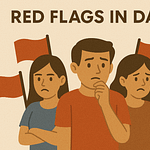
Fear of commitment is a common challenge in dating and relationships. It refers to the anxiety or hesitation someone feels when faced with making a long-term emotional connection or promise. This fear can interfere with forming stable, healthy partnerships. Addressing this issue is vital for those seeking meaningful relationships.
II. The Psychology Behind Fear of Commitment 🧬
A. Common Psychological Reasons
Many fears of commitment stem from internal anxieties. These may include fear of abandonment, fear of vulnerability, or a desire to maintain personal independence. People with anxiety or low self-esteem may feel unworthy of love or fear that relationships will eventually end in rejection.
B. Cultural and Societal Influences
Modern dating often emphasizes freedom and endless choices, which can make commitment seem restrictive or outdated. Society’s mixed messages—encouraging both independence and connection—can create confusion and lead to fear when relationships become serious.
C. Personal Histories and Experiences
Past relationships play a powerful role. Individuals who have experienced betrayal, divorce, or toxic relationships may avoid commitment as a form of self-protection. Childhood experiences, including witnessing the instability of parental relationships, can also contribute.
III. Signs of Fear of Commitment in Dating 🚩
A. Avoidance of Labeling Relationships
Someone with commitment issues might avoid terms like “boyfriend,” “girlfriend,” or “partner.” They prefer to keep things casual and resist discussions about where the relationship is headed.
B. Reluctance to Plan for the Future
If your partner hesitates or changes the subject when you talk about future plans—like vacations, moving in together, or meeting families—it may signal a deeper fear of being tied down.
C. Seeking Flaws in Potential Partners
Those afraid of commitment often find reasons to end relationships prematurely. They may focus on minor imperfections and use them as justification to keep emotional distance.
D. Frequent Changes in Partners
Serial dating and difficulty maintaining lasting relationships are common patterns. Once a connection starts to deepen, they withdraw or leave, repeating the cycle with someone new.
IV. Impact of Fear of Commitment on Relationships 💔
A. Emotional Consequences for Both Partners
One-sided emotional investment can lead to confusion, frustration, and pain. The committed partner may feel undervalued or ignored, while the avoidant partner might struggle with guilt or internal conflict.
B. Effects on Relationship Longevity
Unresolved fear of commitment often leads to short-lived relationships. Progress is stalled, and long-term satisfaction becomes difficult to achieve.
C. Challenges in Forming Deeper Connections
Commitment deepens intimacy. When fear stands in the way, true emotional closeness is hard to achieve. Trust, mutual growth, and support may suffer.
V. Coping with Fear of Commitment 🛠️
A. Self-Reflection and Understanding Personal Fears
The first step is recognizing the fear. Ask yourself: What am I afraid of losing? Have past experiences influenced how I view relationships? Awareness is essential for change.
B. Open Communication with Partners
Honest conversations about your fears can prevent misunderstandings. Let your partner know where you stand and be willing to listen to their concerns too. Mutual understanding can ease pressure and build empathy.
C. Seeking Professional Help or Counseling
Therapists can help identify root causes and unhealthy patterns. Individual or couples counseling provides a safe space to work through fears and learn healthier relationship behaviors.
VI. Strategies for Overcoming Fear of Commitment 🧭
A. Gradual Exposure to Commitment
Start small. Instead of rushing into long-term planning, focus on being present. Spending consistent time with a partner, showing support, and gradually taking steps forward can reduce anxiety tied to commitment.
B. Setting Realistic Relationship Goals
It’s helpful to set personal goals that reflect what you want from a relationship. These might include increasing emotional availability or being more open about plans. Clear goals give direction and confidence.
C. Building Trust and Security in Relationships
Consistent actions and open dialogue build trust. Trust reduces fear by showing that emotional safety exists within the relationship. When both partners feel secure, commitment becomes less threatening.
VII. Supporting a Partner with Fear of Commitment 🤝
A. Providing Reassurance and Understanding
Patience and empathy go a long way. Try to understand your partner’s fears without judgment. Offer reassurance that you’re willing to grow together at a healthy pace.
B. Encouraging Open Dialogue
Ask thoughtful questions like “What concerns you about commitment?” Avoid accusatory language. These conversations encourage honesty and reduce defensiveness.
C. Avoiding Pressure and Ultimatums
Pushing someone into commitment rarely works. Pressure creates stress and may reinforce their fears. Instead, focus on building a strong foundation and give the relationship time to evolve.
VIII. Conclusion ✅
Fear of commitment can hinder personal happiness and relationship fulfillment. It stems from past experiences, personal insecurities, or societal pressure. Recognizing the signs and understanding the root causes is the first step toward building healthier, longer-lasting connections. Whether you’re struggling with this fear or supporting someone who is, know that progress is possible through compassion, communication, and consistent effort.
IX. Additional Resources 📚
A. Recommended Books and Readings
- Attached by Amir Levine and Rachel Heller
- The Seven Principles for Making Marriage Work by John Gottman
- Men Who Can’t Love by Steven Carter and Julia Sokol
B. Online Courses and Workshops
- “Overcoming Fear of Commitment” by The Gottman Institute
- Relationship anxiety webinars on BetterHelp or Calmerry
C. Support Groups and Online Communities
- Reddit communities like r/relationship_advice
- Relationship-focused Facebook groups
- Forums on Psychology Today and similar sites
“`







